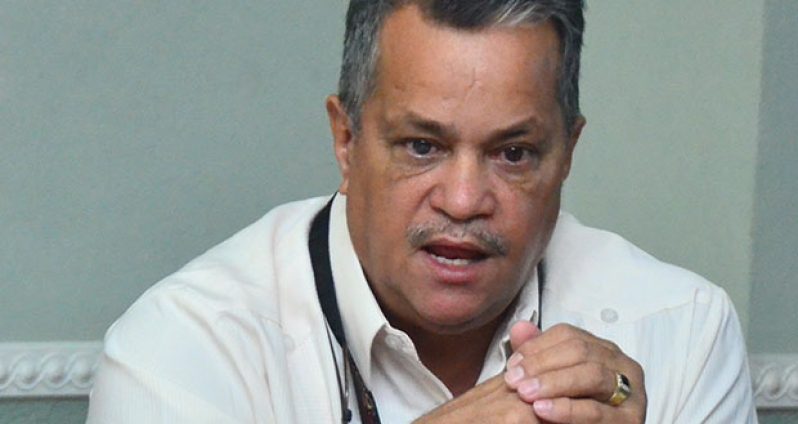FORMER Chairman of the Guyana Private Sector Commission (PSC) Captain Gerry Gouveia says he sees no issue with the move by the APNU+AFC administration to increase the salaries of ministers and Members of Parliament.Late September, Finance Minister Winston Jordan issued an order increasing salaries for ministers by 50% and parliamentarians were given a 19% increase. The vice presidents and Prime Minister were also given a substantial increase. While the move has not resonated well with some sections of the society, Gouveia on Tuesday told reporters that the increase of salaries for ministers was something that should have been done years ago. He explained that with the increase, Guyana’s citizenry now hold ample right to demand the best from them, since they are being duly paid out of the nation’s coffers.
“I actually believe that it is long overdue. I think we must pay our leaders adequate salaries for them to live, and then we can judge them by the work they produce,” stated Captain Gouveia. Gouveia was emphatic about the fact that the increase may have been done at an inconvenient time, but it was necessary, given the scope of work that the ministers will have to undertake. “The fact that it happened so quickly, the timing may have been a challenge…I would say that I really don’t have an objection to an increase of salaries because I want them to be able to perform,” the former PSC Chairman noted.
“Now we can judge them by the results they deliver to us. Now they can understand and have a better appreciation that they must support salary increases across the board for our public servants, but I have no problem taking care of our ministers and paying them proper salaries,” he added.
Gouveia, however, is not the lone voice outside of the APNU+AFC administration who sees the increase as necessary. President of the Guyana Trades Union Congress (GTUC), Lincoln Lewis and Guyana Public Service Union (GPSU) President Patrick Yarde have both endorsed the decision by the administration. President David Granger has also been forced to defend the issue, saying that it should not be seen as selfish or greedy. The President explained that since Guyana attained independence in 1966, government had been designed to attract talent and “sometimes persons were paid at different rates.”
“This has continued. What we did is nothing new,” the President underscored, adding that his administration inherited a situation where “there was already differentiation in salary payment at some levels.” “Everyone knows that Ms. Gail Texeira, Dr. Roger Luncheon, and Anil Nandlall were not paid normal ministers’ salaries…I would like to emphasise that we did spend quite a lot of time; it was not a rash or hasty decision,” the President remarked. “It was not a selfish or greedy decision. “We took time to consider all aspects of this problem, and in the final analysis we felt it was the correct thing to do to ensure a quality of governance from our cabinet,” he said. Granger noted that many of the ministers of government are not “in their early careers.”
“They have established themselves in various professions and in public life and it would have been unreasonable to demand they have a sudden or massive drop in income.” There are five lawyers and many other professionals in the Cabinet, the President said.
As a result, he believes “some consideration had to be given not to damage the quality of life by drastically reducing their incomes.”
President Granger explained that there are four levels of ministerial appointments.
The Prime Minister is the first level, followed by vice presidents, cabinet ministers and then junior ministers.
In the past, he said there was only one level of ministers.
“What we had is that there was one level and ministers performing different functions, some with heavy workloads.
“Administrative and regulatory or supervisory functions were being paid at the same level as the person they are supervising.
“There is a precedent issue that every government has had to pay to attract talent, and we have talent and many of our people are late career, and it is not as though this is their first job.
“This is a job to which they bring tremendous amounts of experience and knowledge, and it is appropriate that they should be adequately rewarded,” Granger told the Guyana Chronicle. The naysayers of the increase include the opposition People’s Progressive Party (PPP) which has argued that the increases are essentially “meat for the boys.” But, the President was firm that “It was not a selfish or greedy decision…we took time to consider all aspects of this problem and in the final analysis we felt it was the correct thing to do to ensure a quality of governance from our Cabinet.”




.jpg)










